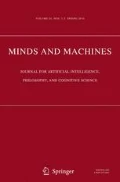Abstract
This paper discusses how we understand and use a concept or the meaningof a general term to identify the objects falling under the term. There aretwo distinct approaches to research on the problems of concepts and meaningthe psychological approach and the formal (or logical) approach. My majorconcern is to consider the possibility of reconciling these two differentapproaches, and for this I propose to build a psychologically plausibleformal system of conceptualization. That is, I will develop a theory-basedaccount of concepts and propose an explanation of how an agent activates aperspective (which consists of theories) in response to a situation in whichreasoning using a concept is called for. Theories are represented as sets offacts and rules, both strict and defeasible. Each theory is organized in acoherent perspective which stands for an agent's mental state or an agent'smodel of another agent's perspective. Perspectives are organized intohierarchies and the theory for a concept in one perspective may defeat thetheory for the same concept in another perspective. Which perspective issuperior is context-dependent.
Similar content being viewed by others
References
Barsalou, L. W. (1983), ‘Ad Hoc Categories’, Memory and Cognition 11, pp. 211–227.
Braisby, N. (1990), ‘Situating Word Meaning’, in R. Cooper, K. Mukai, and J. Perry, eds., Situation Theoryand Its Applications, Stanford University Press, pp. 315–342.
Braisby, N., Franks, B., and Myers, T. (1989),’ ‘Partiality andConference in ConceptCombination’, in J. Ezquerro and J. Larrazabal, eds., Cognition, Semantics and Philosophy,Norwell, MA Kluwer, Academic Publisher, pp. 179–208.
Chomsky, N. (1993), Language and Thought, Wakefield, Rhode Island Moyer Bell.
Chomsky, N. (1962), ‘A Transformation Approach to Syntax’, in A. A. Hill, ed., Proceedings of the Third Texas conference on Problems of Linguistic Analysis in English, Austin, TX The University of Texas, pp 124–158.
Currie, G. (1982), Frege An Introduction to his Philosophy,Sussex, Great Britain The Harvester Press.
Eco, U., Santambrogio, M., and Violi, P. (1988), Meaning and Mental Representations, Bloomington and Indianapolis: Indiana University Press.
Frege, G. (1892), ‘On Sense and Meaning’, in A. P. Martinich, ed., The Philosophy of Language, New York, NY Oxford University Press. 1985.
Frege, G. (1964), The Basic Laws of Arithmetic: Exposition of the System, in M. Furth, tr. and ed., Berkeley, CA Uniersity of California Press.
Gärdenfors, P. (1993), ‘The Emergence of Meaning’, Linguistics and Philosophy 16, pp. 285–309.
Geerts, P., Nute, D., and Vermeir, D. (1994), ‘Ordered Logic: Defeasible Reasoning for Multiple Agents’, Decision Support Systems II, pp. 157–190.
Johnson-Iaird, P. N. (1988), ‘How Is Meanin Mentally Repesented?’, in U. Eco, M. Santambrogio, and P. Violi, eds., Meaning and Mental Representations, Indiana University Press, pp. 99–118.
Katz, J. J. (1981), Language and Other Abstract Objects, Totuwa Rowman and Littlefield.
Katz, J. J. (1984), ‘An Outline of Platonist Gramrnar’, in T. Bever, J. Carroll, and L. Miller, eds., Talking Minds, Carnridge, MA The MIT Press.
Keil, F. C. (1979), Semantic and Conceptual Development: An Ontological Perspective, Cambridge, MA Harvard University Press.
Keil, F. C. (1989), Concepts, Kinds, and Cognitive Development, Cambridge, MA MIT Press.
Keil, F. C. (1995), ‘The Growth of Causl Undertandings of Natural Kinds’, in D. Sperber, D. Premack,, and A. J. Premack, eds., Causal Cognition: A Multidisciplinary Debate, New York Oxford University Press.
Kintsch, W. (1984), ‘Approaches to the Study of the Psychology of Language’, in T. Bever, J. Carroll, and L. Miller, eds., Talking Minds, Cambridge, MA: The MIT Press.
Kronfeld, A. (1990), Reference and Computation, Cambridge: Cambridge University Press.
Levesque, H. J. (1989), ‘Logic and the Complexity of Axiomatics’, in R.H. Thomason, ed., Philosophical Logic and Artificial Intelligence, Hingham, MA: Kluwer Academic Publishers.
Lifschitz V. (1985), ‘Closed-World Databases and Circumscription’, Artificial Intelligence 27, pp. 229–235.
McCarthy, J. (1980), ‘Circumscription–A Formof Nonmonotonic Reasoning’, Artificial Intelligence 13, pp. 27–39.
McDermott, L. C. and Doyle, J. (1984), ‘Non-Monotonic Logic I’, Artificial Intelligence 13, pp. 41–72.
Medin, D. and Wattenmaker, W. (1987), ‘Category Cohesiveness, Theories, and Cognitive Archeology’, in U. Neisser, ed., Concepts and Conceptual Development: The Ecological and Intellectual Factors in Categories, Cambridge: Cambridge University Press.
Murphy, G. and Medin, D. (1985), ‘The Role of Theories in Conceptual Coherence’, Psychological Review 92, pp. 289–316.
Nute, D. (1989), ‘A Review of Matthew L. Ginsberg, Readings in Nonmonotonic Readings’, Philosophical Psychcology 2, pp. 351–355.
Reiter, R. (1980), ‘A Logic for Default Reasoning’, Artificial Intelligence 13, pp. 81–132.
Reiter, R. (1987), ‘Nonmonotonic Reasoning’, Annual Review of Computer Science, Palo Alto, CA Annual Review Inc.
Schwartz S. P. (1977), Naming, Necessity, and Natural Kinds, Ithaca, N.Y. Cornell University Press.
Thagard, Paul (1992), Conceptual Revolutions, Princeton, NJ: Princeton University Press.
Author information
Authors and Affiliations
Rights and permissions
About this article
Cite this article
Kim, HG. A Psychologically Plausible Logical Model of Conceptualization. Minds and Machines 7, 249–267 (1997). https://doi.org/10.1023/A:1008234817601
Issue Date:
DOI: https://doi.org/10.1023/A:1008234817601



